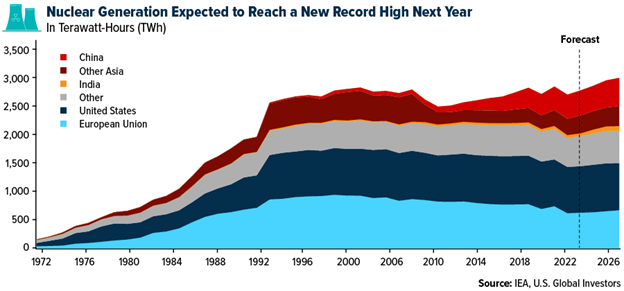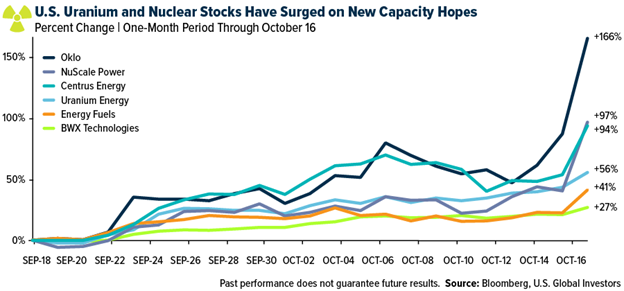If you’ve been paying attention to the markets, especially in recent months, you’ve likely noticed something interesting happening with nuclear energy stocks. Shares of companies involved in uranium and nuclear, like Nuscale Power (NYSE:SMR), Oklo (NYSE:OKLO), Cameco (NYSE:CCJ) and Centrus Energy (NYSE:LEU), have been surging, driven in large part by groundbreaking nuclear energy deals with major tech firms.
This trend isn’t just another market blip—it’s part of a larger movement that has far-reaching implications for investors, especially as we enter the age of artificial intelligence (AI). Nuclear energy truly appears to be staging a major comeback.
The AI Boom and the Need for Power
You don’t have to be a tech expert to know that AI is changing everything. From self-driving cars to advanced data analytics, artificial intelligence is quickly becoming a key part of our modern economy, valued at $184 billion today. But what many people don’t realize is just how much electricity is required to power the data centers that make AI possible.
Companies like Microsoft (NASDAQ:MSFT), Amazon (NASDAQ:AMZN) and Google (NASDAQ:GOOGL) are racing to build out data centers capable of handling this incredible demand, and they need a lot of energy to do it. By one estimate, data centers could consume up to 9% of the United States’ electricity by 2030, more than double what they’re using today. That’s a staggering amount of power, and it raises serious questions about how we’re going to meet that demand in a way that’s both reliable and sustainable.
Here’s the thing: Renewable energy sources like wind and solar, as popular as they are, simply aren’t enough to get the job done. They’re intermittent, meaning they can’t provide electricity 24/7. That’s where nuclear comes in.
The Nuclear Renaissance
For years, nuclear power has been out of favor in the U.S. High costs, regulatory hurdles and the public’s lingering fears from accidents like Chernobyl and Fukushima have kept many from embracing it.
But times are changing. This week alone, we saw two major announcements that signal what I believe is a new era for nuclear energy in the U.S.
Amazon signed agreements to support the construction of several new Small Modular Reactors (SMRs) in the Pacific Northwest. These reactors, owned and operated by Energy Northwest, will eventually generate enough power to serve the needs of over 770,000 U.S. homes. Meanwhile, Google announced a partnership with Kairos Power to bring 500 megawatts of SMRs online by 2035.
Perhaps the most eye-catching deal came from Microsoft, which made headlines for partnering with Constellation Energy (NASDAQ:CEG) to revive the Three Mile Island nuclear plant—yes, that Three Mile Island, renamed as Crane Clean Energy Center. Microsoft is betting $1.6 billion to restore the plant by 2028 and secure carbon-free energy for the next 20 years.
Add all this up, and 2025 is expected to usher in a record amount of nuclear generation, with more than half of it coming from China and India, according to the International Energy Agency (IEA).
A Golden Opportunity for Investors?
What’s driving these tech giants to invest in nuclear? Simple: Nuclear power offers reliable, clean energy 24/7, making it potentially capable of meeting the enormous demands of AI-driven data centers. The Electric Power Research Institute (EPRI) recently released a report showing that data centers’ electricity consumption could more than double by 2030. As demand skyrockets, traditional renewables like solar and wind won’t be able to provide the uninterrupted power that companies like Amazon, Microsoft and Google require.
In the long run, these tech companies are likely making smart bets. Bain & Co. forecasts that U.S. energy demand could outstrip supply in just a few short years. By 2028, utilities will need to increase annual electricity generation by up to 26% to keep pace with projected demand. Nuclear power is uniquely positioned to fill the gap, and it’s no wonder Wall Street has started to take notice.
Since Microsoft’s nuclear deal with Constellation was announced, stocks in companies like Oklo have skyrocketed. Oklo, which is backed by OpenAI CEO Sam Altman, has surged more than 166% in the month through mid-October. Other nuclear stocks, including NuScale and Centrus Energy, have also seen impressive gains. For investors looking for exposure to the energy sources that will power the AI age, nuclear might just be the next big thing.
The Long Road Ahead
Nuclear power is not without its challenges. Building new plants is still incredibly expensive, and the industry has been plagued by cost overruns for years. Just look at Microsoft’s deal with Constellation—according to Morgan Stanley (NYSE:MS), Microsoft is paying at least 100% over market rates for the power they’ll get from Three Mile Island.
But given the powerful demand trends we’re seeing, this could actually turn out to be a bargain a few years down the road. Nuclear energy provides reliable, carbon-free power at a scale that renewables simply can’t match, and with global data center energy consumption expected to double by 2027, we believe that the value proposition for nuclear is only going to grow stronger.
What This Means for You
So what does all of this mean for investors? With the AI revolution driving massive demand for electricity, nuclear power is well-positioned to be a major player in the energy market for decades to come.
The entire U.S. energy sector, in fact, is going to need a significant overhaul to meet future demand. The U.S. operates the largest nuclear fleet in the world with 94 reactors, but that’s not going to be enough. To ensure our energy security and to meet our carbon reduction goals, I believe we should significantly expand the current fleet.
Poll:
How would you describe your opinion of nuclear power?
- Very favorable
- Somewhat favorable
- Somewhat unfavorable
- Very unfavorable
Past performance does not guarantee future results. All opinions expressed and data provided are subject to change without notice. Some of these opinions may not be appropriate to every investor. By clicking the link(s) above, you will be directed to a third-party website(s). U.S. Global Investors does not endorse all information supplied by this/these website(s) and is not responsible for its/their content.
Holdings may change daily. Holdings are reported as of the most recent quarter-end. The following securities mentioned in the article were held by one or more accounts managed by U.S. Global Investors as of (09/30/2024): Amazon.com.
